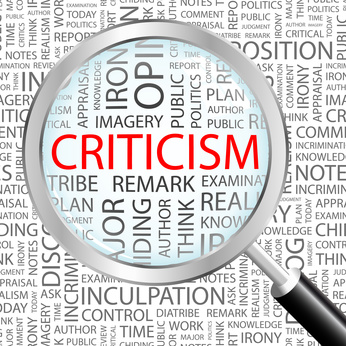There just isn’t any other way of saying it.
For anxiety sufferers dealing with criticism is especially hard, because it seems to arouse our worst fears about being judged or belittled.
And it’s not like being sensitive to criticism is unique to people with anxiety, it’s just that many of us – like so many other things – react to it fiercely.
For example, when I graduated from University and got my first “real job” I wasn’t prepared for the rough and tumble world of corporate style criticism.
My first reaction was almost always anger and resentment. But why do so many of us react this way?
Well, for starters, anxiety can make you sensitive to any form of insult, whether real or imagined. When you’re chronically anxious you already feel tense, worried, depressed, maybe even a little agitated.
Then, you add the fact that you’re self-conscious, shy, and nervous all the time – and uncomfortable conversations of any kind are almost all bad, especially if you really have screwed up.
I don’t think anyone likes to be criticized, but when you’re anxious, criticism can be jolting and make you come to conclusions that are far outside what the critic ever meant. So, this article is to give you some tips on how to cope with this inevitable social encounter.
- Listen – I started with this one because it’s the most important. When someone is criticizing you it’s not always a bad thing and you can, in fact, learn a thing or two. So it’s important to listen to your critics to understand what the problem is, what went wrong, and how it can be fixed.
- Don’t Take it Personally – In a close second, is don’t take it personal. Although some criticism can be non-constructive, most critics have a legitimate concern that needs to be addressed. Taking criticism can be hard to master, but it’s important to understand that criticism is not synonymous with personal attack. This is because most criticism is not about you, maybe something you did, but that’s not the same thing.
- Be objective – Like I already pointed out, I remember being criticized and flying off the handle – at least inside – and getting very angry when I was criticized. As if I were infallible or something. Anxious or not, no one is perfect, so we shouldn’t act like we are. We all make mistakes, and when a teachable moment arrives, we should embrace it. When you feel anger or embarrassment welling up inside of you just remind yourself that it’s OK to be corrected.
- Ask for Feedback – After you’ve listened, controlled your emotions, and looked at things objectively, try asking for feedback. In other words, be open to criticism as a way of improving yourself, your performance at work and so on. And ask questions to find out exactly how you can make those improvements.
- Admit Fault – If it was something you did wrong, and you know it, say so. This doesn’t always require an apology, but it just means that you acknowledge your mistake(s).
- Set Limits – OK, so now you’re a master of coping with criticism. This, however, doesn’t mean that you should take crap from anybody. What is crap? Criticism about your physical features, religion, etc. Being open to constructive criticism does not mean that you take abuse from people and let them rant about things that you can’t influence. If it’s out of bounds let the critic know.
- Don’t Avoid Criticism – Whenever you avoid anything because of fear, that fear gets stronger. So, don’t shy away from criticism. In fact, you might even ask for some on occasion. Not to get your feelings hurt, but to improve your ability to cope with it.
The point is that most criticism isn’t all bad, and believe or not, it’s necessary. Why? Well, imagine if everyone just did whatever they wanted and were never corrected. I assure you that mayhem would ensue.
It’s natural to be wary of criticism when you’re anxious. Being criticized can make you feel small, trapped, and naked with flaws. But it’s also a part of life and something that has to be dealt with, like so many other things.
When someone offers criticism see what the problem is, fix the issue, learn from it and let it go. Now, letting go can be tricky, given all the self doubt that anxiety fosters and all, but you have to try hard and do it anyway.
So, in the future try not to project your fear and insecurity on other people. If this affects you a lot right now, then be sure to actually work on your reaction to criticism. Don’t let things stay as they are.
This will help you to build confidence in yourself, increase self-control, and even reduce anxiety.






hi paul great post ive been going through something similar i dont know if i would call it criticism but for a couple of weeks now some of my peers having been telling me you seem sad and that i havent been myself lately but im really not and nothings wrong but when they start to tell me this things then i do start to feel like somethings wrong and its just downhill from there until i cheer myself up ..
Hi Deontae, I’ve gotten this criticism/comment often myself.
I think what happens is that sometimes we get in a rut and we don’t even know it.
To the point where you might be feeling “OK” but your OK to other people may look like depression or sadness.
Some times people take this criticism too far, as if we are all to be smiling 24/7. But, at the same time, sometimes we are bummed out and don’t know it fully because we can’t see ourselves.
You can’t see your posture, your own smile, your demeanor and so on.
So, it could be that those folks have some insight you don’t… but ultimately only you know how you feel and if you feel OK, then you’re OK.
Don’t feel pressured into being a certain way or saying certain things.
And if it turns out that you are feeling down, then address that in your own way.
Don’t let it bother you though. I know some happy looking people that are dead inside, and visa versa.
So, again, if you’re happy and you know it, I wouldn’t worry too much about it.
very nice post, i would also add that examining the criticism to find whether its constructive or not would help
What if someone you dearly love, knows you have PTSD, yet constantly criticizes everything you do, say, have done in the past yet have not repeated, tells you their family can’t stand you, that you are stupid, etc.? HOW CAN THIS AFFECT THE PERSON WITH ANXIETY DISORDER AND PTSD?
I can see this type of dynamic eating away at your self-esteem. Beyond that, I’d say higher level of stress is also more likely.